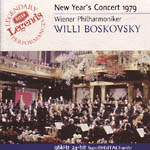In his day, Willi Boskovsky, said to have the “Viennese lilt in his genes”, was considered one of the great exponents of the Viennese Waltz. And these performances are indeed imbued with a wholly idiomatic rubato, irresistible flow, and a nearly discernible smile among the players. Aside from Wine, Women, and Song, Pizzicato Polka, On the Beautiful Blue Danube, Suppé’s The Beautiful Galatea, and, of course, the Radetzky March, most of the 18 selections here probably won’t register high on the familiarity scale with most listeners. However, that fact doesn’t lessen their ability to entertain, beginning with catchy titles such as With the brakes off (Eduard Strauss), The Emancipated Woman (Josef Strauss), and If you please (Johann Strauss II).
As a testament to the fine musicianship of Boskovsky, and as a document of his last New Year’s Day concert with the Vienna Philharmonic, this release has considerable value. However, it has no value as an audiophile disc, despite Decca’s claims to the contrary. This was the company’s first digital recording and as such was subject to the limitations of the existing (albeit revolutionary) technology and engineering techniques that were evolving to adapt to it. Accordingly, the sound is grossly over-bright, harsh, and bodiless. (The applause between numbers sounds particularly unpleasant.) Decca had somewhat better results in Vienna later that year with Kirill Kondrashin conducting Dvorák’s New World Symphony. That magnificent performance was graced with a more natural sound, and would certainly qualify as a Decca Legend.
































